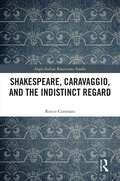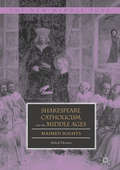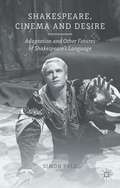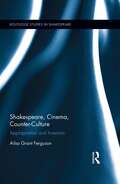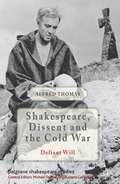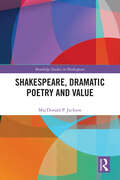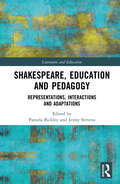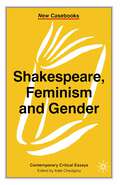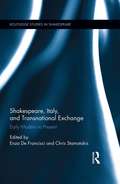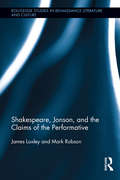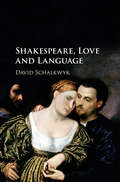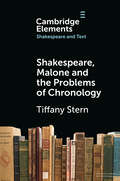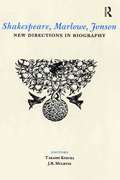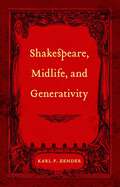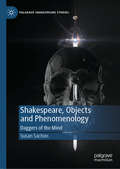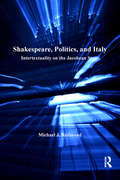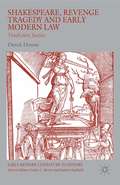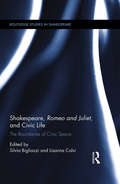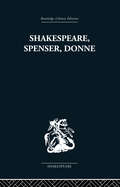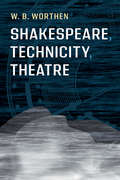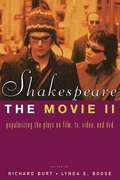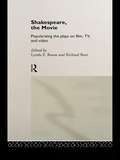- Table View
- List View
Shakespeare, Caravaggio, and the Indistinct Regard (Anglo-Italian Renaissance Studies)
by Rocco CoronatoThis volume presents a contrastive study of the overlapping careers of Shakespeare and Caravaggio through the comparison of their strikingly similar conventional belief in symbol and the centrality of the subject, only to gradually open it up in an exaltation of multiplicity and the "indistinct regard" (Othello). Utilizing a methodological premise on the notions of early modern indistinction and multiplicity, Shakespeare, Caravaggio, and the Indistinct Regard analyses the survival of English art after iconoclasm and the circulation of Italian art and motifs, methodologically reassessing the conventional comparison between painting and literature. The book examines Caravaggio’s and Shakespeare’s works in the perspective of the gradual waning of symbolism, the emergence of chiaroscuro and mirror imagery underneath their radically new concepts of representation, and the triumph of multiplicity and indistinction. Furthermore, this work assesses the validity of the twin concepts of multiplicity and indistinction as an interpretive tool in a dialectical interplay with much recent work on indeterminacy in literary criticism and the sciences.
Shakespeare, Catholicism, and the Middle Ages: Maimed Rights (The New Middle Ages)
by Alfred ThomasWhereas traditional scholarship assumed that William Shakespeare used the medieval past as a negative foil to legitimate the present, Shakespeare, Catholicism, and the Middle Ages offers a revisionist perspective, arguing that the playwright valorizes the Middle Ages in order to critique the oppressive nature of the Tudor-Stuart state. In examining Shakespeare’s Richard II, The Merchant of Venice, Hamlet, King Lear, Macbeth, and The Winter’s Tale, the text explores how Shakespeare repossessed the medieval past to articulate political and religious dissent. By comparing these and other plays by Shakespeare’s contemporaries with their medieval analogues, Alfred Thomas argues that Shakespeare was an ecumenical writer concerned with promoting tolerance in a highly intolerant and partisan age.
Shakespeare, Cinema and Desire
by Simon RyleShakespeare, Cinema and Desire explores the desires and the futures of Shakespeare's language and cinematographic adaptations of Shakespeare. Tracing ways that film offers us a rich new understanding of Shakespeare, Simon Ryle highlights issues that are central to both Shakespeare and film: media technologies, narrative territories and flows, mourning and loss, the voice, the body, sexuality and gender. The recirculation of Shakespearean ideas in the critical theory of modernity, especially figures such as Jacques Lacan, Maurice Blanchot, Jacques Derrida, and Gilles Deleuze, parallels the negotiations of film adaptation. By focusing on the dialogue between Shakespeare and modernity, this study explores how Shakespeare film adaptation raises broad questions concerning the emancipatory potential of aesthetics. Shakespeare is the source of more movie screenplays than any other writer in history, and negotiations between Shakespeare and developing cinematic technologies have been influential across the history of cinema. This book contributes a much needed analysis of the relation of Shakespeare's language to film form, providing in-depth studies of major Shakespeare adaptations from directors such as Akira Kurosawa, Peter Greenaway, Joseph Mankiewicz, Grigori Kozintsev, Svend Gade, Jean-Luc Godard, and Laurence Olivier.
Shakespeare, Cinema, Counter-Culture: Appropriation and Inversion (Routledge Studies in Shakespeare #17)
by Ailsa Grant FergusonAddressing for the first time Shakespeare’s place in counter-cultural cinema, this book examines and theorizes counter-hegemonic, postmodern, and post-punk Shakespeare in late 20th and early 21st century film. Drawing on a diverse range of case studies, Grant Ferguson presents an interdisciplinary approach that offers new theories on the nature and application of Shakespearean appropriations in the light of postmodern modes of representation. The book considers the nature of the Shakespearean inter-text in subcultural political contexts concerning the politicized aesthetics of a Shakespearean ‘body in pieces,’ the carnivalesque, and notions of Shakespeare as counter-hegemonic weapon or source of empowerment. Representative films use Shakespeare (and his accompanying cultural capital) to challenge notions of capitalist globalization, dominant socio-cultural ideologies, and hegemonic modes of expression. In response to a post-modern culture saturated with logos and semiotic abbreviations, many such films play with the emblematic imagery and references of Shakespeare’s texts. These curious appropriations have much to reveal about the elusive nature of intertextuality in late postmodern culture and the battle for cultural ownership of Shakespeare. As there has yet to be a study that isolates and theorizes modes of Shakespearean production that specifically demonstrate resistance to the social, political, ideological, aesthetic, and cinematic norms of the Western world, this book expands the dialogue around such texts and interprets their patterns of appropriation, adaptation, and representation of Shakespeare.
Shakespeare, Computers, and The Mystery of Authorship
by Arthur F. Kinney Hugh CraigCraig, Kinney and their collaborators confront the main unsolved mysteries in Shakespeare's canon through computer analysis of Shakespeare's and other writers' styles. In some cases their analysis confirms the current scholarly consensus, bringing long-standing questions to something like a final resolution. In other areas the book provides more surprising conclusions: that Shakespeare wrote the 1602 additions to The Spanish Tragedy, for example, and that Marlowe along with Shakespeare was a collaborator on Henry VI, Parts 1 and 2. The methods used are more wholeheartedly statistical, and computationally more intensive, than any that have yet been applied to Shakespeare studies. The book also reveals how word patterns help create a characteristic personal style. In tackling traditional problems with the aid of the processing power of the computer, harnessed through computer science, and drawing upon large amounts of data, the book is an exemplar of the new domain of digital humanities.
Shakespeare, Dissent, and the Cold War
by Alfred ThomasShakespeare, Dissent and the Cold War is the first book to read Shakespeare's drama through the lens of Cold War politics. The book uses the Cold War experience of dissenting artists in theatre and film to highlight the coded religio-political subtexts in Hamlet, King Lear, Macbeth and The Winter's Tale.
Shakespeare, Dramatic Poetry and Value (Routledge Studies in Shakespeare)
by MacDonald P. JacksonThis book redirects attention to a truth largely ignored by recent criticism—that Shakespeare’s excellence as a playwright is inextricable from his excellence as a poet. It explores the diverse means by which Shakespeare’s poetry enriches his drama, illustrating how particular words in a particular order render his dialogue distinctive and create supreme literary and dramatic value. By examining many passages, long and short and from a variety of Shakespeare’s plays—comedies, histories, tragedies, later plays—the author aids understanding of the poetic effects that make Shakespeare preeminent. His analyses, alert to textual variants and cruxes, are illuminated by comparisons: Shakespeare’s early verse is compared with his later verse and samples of Shakespearean dialogue are compared with versions in later adaptations, in modernizations, and inferior quarto texts, as well as with contributions by his co-authors to collaborative plays. The contrasts throw into relief the surpassing vitality and expressiveness of Shakespeare’s own language. Since the rhythmic vitality of Shakespeare’s verse is essential to how and what it communicates, an appendix on the principles of iambic pentameter is included to support those aspects of the analyses that refer to acoustic subtleties.
Shakespeare, Education and Pedagogy: Representations, Interactions and Adaptations (Literature and Education)
by Pamela Bickley Jenny StevensThis volume captures the diverse ways in which Shakespeare interacts with educational theory and practice. It explores the depiction of learning and education in the plays, the role of Shakespeare as pedagogue, and ways in which the teaching of Shakespeare can facilitate discussion of some of the urgent questions of modern times. The book offers a wide range of perspectives – historical, theoretical, theatrical. The Renaissance humanist learning underpinning Shakespeare’s own work is explored in essays that consider how the complexity of Shakespeare’s drama challenges early-modern pedagogical orthodoxies. From close analysis of individual, solitary reflection on Shakespeare’s writing, the book moves outward to engage with contemporary social issues around inclusivity, society, and the planet, demonstrating the many educational contexts in which Shakespeare is currently appropriated. Engaging with current questions of the value of literary study, the book testifies to the potentialities of an empowering Shakespearean pedagogy. Bringing together voices from a variety of institutions and from a wide range of educational perspectives, this volume will be essential reading for academics, researchers and post-graduate students of Shakespeare, literature in education, pedagogy and literary theory.
Shakespeare, Feminism and Gender (New Casebooks)
by Kate ChedgzoyOver the last quarter-century, feminist criticism of Shakespeare has greatly expanded and enriched the range of interpretations of the Shakespearean texts, their original historical location, and subsequent reinterpretation. Characteristically it weaves between past and present, driven by a commitment both to intervene in contemporary cultural politics and to recover a fuller sense of the sexual politics of the literary heritage. Collecting together essays which offer detailed accounts of particular plays with others that take a broader overview of the field, this Casebook showcases the range of critical strategies used by feminist criticism, and illustrates how vital attention to the politics of gender and sexuality is to a full understanding and appreciation of Shakespearean drama.
Shakespeare, Italy, and Transnational Exchange: Early Modern to Present (Routledge Studies in Shakespeare)
by Enza De Francisci Chris StamatakisThis interdisciplinary, transhistorical collection brings together international scholars from English literature, Italian studies, performance history, and comparative literature to offer new perspectives on the vibrant engagements between Shakespeare and Italian theatre, literary culture, and politics, from the sixteenth to the twenty-first century. Chapters address the intricate, two-way exchange between Shakespeare and Italy: how the artistic and intellectual culture of Renaissance Italy shaped Shakespeare’s drama in his own time, and how the afterlife of Shakespeare’s work and reputation in Italy since the eighteenth century has permeated Italian drama, poetry, opera, novels, and film. Responding to exciting recent scholarship on Shakespeare and Italy, as well as transnational theatre, this volume moves beyond conventional source study and familiar questions about influence, location, and adaptation to propose instead a new, evolving paradigm of cultural interchange. Essays in this volume, ranging in methodology from archival research to repertory study, are unified by an interest in how Shakespeare’s works represent and enact exchanges across the linguistic, cultural, and political boundaries separating England and Italy. Arranged chronologically, chapters address historically-contingent cultural negotiations: from networks, intertextual dialogues, and exchanges of ideas and people in the early modern period to questions of authenticity and formations of Italian cultural and national identity in the eighteenth and nineteenth century. They also explore problems of originality and ownership in twentieth- and twenty-first-century translations of Shakespeare’s works, and new settings and new media in highly personalized revisions that often make a paradoxical return to earlier origins. This book captures, defines, and explains these lively, shifting currents of cultural interchange.
Shakespeare, Jonson, and the Claims of the Performative: Shakespeare, Jonson, And The Claims Of The Performative (Routledge Studies in Renaissance Literature and Culture #22)
by Mark Robson James LoxleyThis book will constitute an original intervention into longstanding but insistently relevant debates around the significance of notions of ‘performativity’ to the critical analysis of early modern drama. In particular, the book aims to: show how the investigation of performativity can enable readings of Shakespeare and Jonson that challenge the dominant methodological frameworks within which those plays have come to be read; demonstrate that the thought of performativity does not come to rest in the simplicity of method or instrumentality, and that it resists its own claim that language and action might be understood as unproblematically instrumental; demonstrate that this self-resistance occurs or takes place as a moment in the process of articulating the claims of the performative, and that this process is itself in an important sense dramatic.
Shakespeare, Love and Language
by David SchalkwykWhat is the nature of romantic love and erotic desire in Shakespeare's work? In this erudite and yet accessible study, David Schalkwyk addresses this question by exploring the historical contexts, theory and philosophy of love. Close readings of Shakespeare's plays and poems are delivered through the lens of historical texts from Plato to Montaigne, and modern writers including Jacques Lacan, Jean-Luc Marion, Ludwig Wittgenstein, Jacques Derrida, Alain Badiou and Stanley Cavell. Through these studies, it is argued that Shakespeare has no single or overarching concept of love, and that in Shakespeare's work, love is not an emotion. Rather, it is a form of action and disposition, to be expressed and negotiated linguistically.
Shakespeare, Malone and the Problems of Chronology (Elements in Shakespeare and Text)
by Tiffany SternIn 1778 Edmond Malone published his first contribution to Shakespeare scholarship, An Attempt to Ascertain the Order in which the Plays Attributed to Shakspeare were Written. He revised and republished it in 1790 and began a further revision of it which was printed posthumously in 1821. This Element will be on the three versions of Malone's Attempt and the way they created, shaped, focused, directed, and misdirected, our idea of the chronology and sequence of Shakespeare's plays. By showing Malone's impressive, fallible choices, adopted or adapted by later editors, it reveals how current Shakespeare editions are, in good and bad ways, Malonian at heart.
Shakespeare, Marlowe, Jonson: New Directions in Biography
by J. R. Mulryne Takashi KozukaA remarkable resurgence of interest has taken place over recent years in a biographical approach to the work of early modern poets and dramatists, in particular to the plays and poems of Shakespeare, Marlowe and Jonson. The contributors to this volume approach the topic in a manner that is at once critically and historically alert. They acknowledge that the biographical evidence for all three authors is limited, thus throwing the emphasis acutely on interpretation. In addition to new scholarship, the essays are valuable for their awareness of the challenges posed by recent redirections of critical methodology. Scepticism and self-criticism are marked features of the writing gathered here.
Shakespeare, Midlife, and Generativity: A Biography
by Karl F. ZenderThe life expectancy in Shakespearean times averaged only about twenty-five to thirty-five years, but those who survived the illnesses of infancy and childhood could look forward to a long life with nearly the same level of confidence as someone living now. But even so long ago, some faced conflicts in their middle and later years that remain familiar today. In Shakespeare, Midlife, and Generativity, Karl F. Zender explores William Shakespeare's depictions of middle age by examining the relationships between middle-aged parents -- mainly fathers -- and their children in five of his greatest plays. He finds that the middle-aged characters in King Lear, Macbeth, Antony and Cleopatra, The Winter's Tale, and The Tempest -- much like their modern counterparts -- experience a fear of aging and debility.Representations of middle age occur throughout the Shakespearean canon, in forms ranging from Jaques' "seven ages" speech in As You Like It to the emphasis -- almost an obsession -- in many plays on relations between the generations. Lear, Zender shows, tries to forestall the approach of old age with a fantasy of literal rebirth in his relationship with Cordelia. Macbeth depicts an even more urgent struggle against midlife decline, while in Antony and Cleopatra, Shakespeare portrays two characters in midlife crisis who attempt to redefine their identities by memorializing their former status and power, now lost. Drawing on Erik Erikson's theory of generativity -- a midlife shift from advancing one's own career to aiding a younger generation -- Zender explores the difficulties Shakespeare's characters face as they transfer power and authority to their children and others in the next generation. Paying careful attention to the plays' moral and ethical implications, he demonstrates how Shakespeare's innovative depiction of the midlife experience focuses on internal psychological understanding rather than external actions such as ceremony and ritual.Illuminating and engaging, Shakespeare, Midlife, and Generativity offers a fresh analysis of several of Shakespeare's most important plays and explores a profound, centuries-old perspective on the challenges inherent in middle age.
Shakespeare, Music and Performance
by David Lindley Bill BarclayMusic has been an essential constituent of Shakespeare's plays from the sixteenth century to the present day, yet its significance has often been overlooked or underplayed in the history of Shakespearean performance. Providing a long chronological sweep, this collection of essays traces the different uses of music in the theatre and in film from the days of the first Globe and Blackfriars to contemporary, global productions. With a unique concentration on the performance aspects of the subject, the volume offers a wide range of voices, from scholars to contemporary practitioners (including an interview with the critically acclaimed composer Stephen Warbeck), and thus provides a rich exploration of this fascinating history from diverse perspectives.
Shakespeare, Objects and Phenomenology: Daggers of the Mind (Palgrave Shakespeare Studies)
by Susan SachonThis book explores ways in which Shakespeare’s writing strategies shape our embodied perception of objects – both real and imaginary – in four of his plays. Taking the reader on a series of perceptual journeys, it engages in an exciting dialogue between the disciplines of phenomenology, cognitive studies, historicist research and modern acting techniques, in order to probe our sentient and intuitive responses to Shakespeare’s language. What happens when we encounter objects on page and stage; and how we can imagine that impact in performance? What influences might have shaped the language that created them; and what do they reveal about our response to what we see and hear? By placing objects under the phenomenological lens, and scrutinising them as vital conduits between lived experience and language, this book illuminates Shakespeare’s writing as a rich source for investigation into the way we think, feel and communicate as embodied beings.
Shakespeare, Politics, and Italy: Intertextuality on the Jacobean Stage (Anglo-Italian Renaissance Studies)
by Michael J. RedmondThe use of Italian culture in the Jacobean theatre was never an isolated gesture. In considering the ideological repercussions of references to Italy in prominent works by Shakespeare and his contemporaries, Michael J. Redmond argues that early modern intertextuality was a dynamic process of allusion, quotation, and revision. Beyond any individual narrative source, Redmond foregrounds the fundamental role of Italian textual precedents in the staging of domestic anxieties about state crisis, nationalism, and court intrigue. By focusing on the self-conscious, overt rehearsal of existing texts and genres, the book offers a new approach to the intertextual strategies of early modern English political drama. The pervasive circulation of Cinquecento political theorists like Machiavelli, Castiglione, and Guicciardini combined with recurrent English representations of Italy to ensure that the negotiation with previous writing formed an integral part of the dramatic agendas of period plays.
Shakespeare, Revenge Tragedy and Early Modern Law: Vindictive Justice (Early Modern Literature in History)
by Derek DunneThis book, the first to trace revenge tragedy's evolving dialogue with early modern law, draws on changing laws of evidence, food riots, piracy, and debates over royal prerogative. By taking the genre's legal potential seriously, it opens up the radical critique embedded in the revenge tragedies of Kyd, Shakespeare, Marston, Chettle and Middleton.
Shakespeare, Rhetoric and Cognition
by Raphael LyneRaphael Lyne addresses a crucial Shakespearean question: why do characters in the grip of emotional crises deliver such extraordinarily beautiful and ambitious speeches? How do they manage to be so inventive when they are perplexed? Their dense, complex, articulate speeches at intensely dramatic moments are often seen as psychological - they uncover and investigate inwardness, character and motivation - and as rhetorical - they involve heightened language, deploying recognisable techniques. Focusing on A Midsummer Night's Dream, Othello, Cymbeline and the Sonnets, Lyne explores both the psychological and rhetorical elements of Shakespeare's language. In the light of cognitive linguistics and cognitive literary theory he shows how Renaissance rhetoric could be considered a kind of cognitive science, an attempt to map out the patterns of thinking. His study reveals how Shakespeare's metaphors and similes work to think, interpret and resolve, and how their struggle to do so results in extraordinary poetry.
Shakespeare, Romeo and Juliet, and Civic Life: The Boundaries of Civic Space (Routledge Studies in Shakespeare)
by Silvia Bigliazzi Lisanna CalviThis volume introduces ‘civic Shakespeare’ as a new and complex category entailing the dynamic relation between the individual and the community on issues of authority, liberty, and cultural production. It investigates civic Shakespeare through Romeo and Juliet as a case study for an interrogation of the limits and possibilities of theatre and the idea of the civic. The play’s focus on civil strife, political challenge, and the rise of a new conception of the individual within society makes it an ideal site to examine how early modern civic topics were received and reconfigured on stage, and how the play has triggered ever new interpretations and civic performances over time. The essays focus on the way the play reflects civic life through the dramatization of issues of crisis and reconciliation when private and public spaces are brought to conflict, but also concentrate on the way the play has subsequently entered the public space of civic life. Set within the fertile context of performance studies and inspired by philosophical and sociological approaches, this book helps clarify the role of theatre within civic space while questioning the relation between citizens as spectators and the community. The wide-ranging chapters cover problems of civil interaction and their onstage representation, dealing with urban and household spaces; the boundaries of social relations and legal, economic, political, and religious regulation; and the public dimension of memory and celebration. This volume articulates civic Romeo and Juliet from the sources of genre to contemporary multicultural performances in political contact-zones and civic ‘Shakespaces,’ exploring the Bard and this play within the context of communal practices and their relations with institutions and civic interests.
Shakespeare, Spenser, Donne: Renaissance Essays
by Frank KermodeFirst published in 1971. This collection of essays discusses some of the central works and areas of literature in the Renaissance period of cultural history. Contents include: Spenser and the Allegorists; The Faerie Queene, I and V; The Cave of Mammon; The Banquet of Sense; John Donne; The Patience of Shakespeare; Survival fo the Classic; Shakespeare's Learning; The Mature Comedies; The Final Plays.
Shakespeare, Technicity, Theatre
by W. B. WorthenThis urgent and provocative study explores contemporary Shakespeare performance to bring a sense of theatre as technology into view. Rather than merely using technologies, the theatre's distinctively intermedial character is essential to its complex technicity; the changing function of gesture and costume, of written documents in the making of performance, of light and sound, and of the interplay of live and recorded acting complicate the sense of theatre as a medium. In a series of probing discussions, Worthen interrogates the interaction of live and mediated acting onstage, the impact of written media from the handwritten scroll to the small-screen app in acting as a technē, the work of Original Practices as an interactive modern theatre technology, the economies of theatrical immersion, and the consequences of an emerging algorithmic theatre, providing a richly theoretical reading of the stakes of theatre as an always-emerging technology.
Shakespeare, The Movie II: Popularizing the Plays on Film, TV, Video and DVD
by Richard Burt Lynda E. BooseFollowing on from the phenomenally successful Shakespeare, The Movie, this volume brings together an invaluable new collection of essays on cinematic Shakespeares in the 1990s and beyond. Shakespeare, The Movie II:*focuses for the first time on the impact of postcolonialism, globalization and digital film on recent adaptations of Shakespeare;*takes in not only American and British films but also adaptations of Shakespeare in Europe and in the Asian diapora;*explores a wide range of film, television, video and DVD adaptations from Almereyda's Hamlet to animated tales, via Baz Luhrmann, Kenneth Branagh, and 1990s' Macbeths, to name but a few;*offers fresh insight into the issues surrounding Shakespeare on film, such as the interplay between originals and adaptations, the appropriations of popular culture, the question of spectatorship, and the impact of popularization on the canonical status of "the Bard."Combining three key essays from the earlier collection with exciting new work from leading contributors, Shakespeare, The Movie II offers sixteen fascinating essays. It is quite simply a must-read for any student of Shakespeare, film, media or cultural studies.
Shakespeare, The Movie: Popularizing the Plays on Film, TV and Video
by Richard Burt Lynda E. BooseShakespeare, The Movie brings together an impressive line-up of contributors to consider how Shakespeare has been adapted on film, TV, and video, and explores the impact of this popularization on the canonical status of Shakespeare.Taking a fresh look at the Bard an his place in the movies, Shakespeare, The Movie includes a selection of what is presently available in filmic format to the Shakespeare student or scholar, ranging across BBC television productions, filmed theatre productions, and full screen adaptations by Kenneth Branagh and Franco Zeffirelli. Films discussed include:* Amy Heckerling's Clueless* Gus van Sant's My Own Private Idaho* Branagh's Henry V* Baz Luhrman's William Shakespeare's Romeo and Juliet* John McTiernan's Last Action Hero* Peter Greenaway's Prospero's Books* Zeffirelli's Hamlet.
